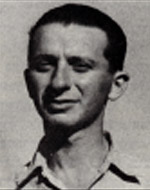Brown, Joseph
Joseph, son of Helen (Helena) and Jacob-Elazar, was born on April 4, 1924 in Hungary, in the southern city of Szeged. The Jewish settlement in Szeged existed since the sixteenth century. At the beginning of the 19th century, the first synagogue was built in the city, and a hundred years later the community established a magnificent synagogue, which has been preserved to this day. In 1920, about 7,000 Jews were counted in the city. Yosef finished high school in his city. After graduating from high school, he moved to Budapest and began studying in a teacher’s study seminary. He was subjected to all the hostility and resentment of the Jews during the war, but he succeeded in continuing his studies and in 1943 was ordained to teach. Hungary was a protectorate of Germany, and as such adopted racial laws and imposed restrictions on the Jews in its territory. Towards the end of the 1930s, manifestations of anti-Semitism intensified, and after the outbreak of the Second World War, the Jews were persecuted and subjected to discrimination and harsh decrees. Many were taken to forced labor and their property was stolen. From the summer of 1939 the Jewish men were taken to the Munkaszolgalat (Labor Service) of the Hungarian army. Tens of thousands perished. The separation of Jews from the general population was completed with the obligation to wear the yellow badge. Hungary was occupied by Germany in March 1944. The Jews were concentrated throughout the country in preparation for their systematic deportation to extermination. The Jews of Budapest were dispersed in special houses marked with a Star of David, and shortly afterwards 17,500 were sent to Auschwitz. In November 1944, a ghetto was established in Budapest in which the Jews were concentrated. From December 1944 to January 1945, the violence in the city intensified, and tens of thousands of Jews were shot on the banks of the Danube. By the end of the war some 550,000 Hungarian Jews perished. In October 1944, the Nazis transferred Yosef’s family to a labor camp, and its traces disappeared. Joseph and his brothers were taken to a concentration camp in 1945. When they were moved to another place, the brother was killed, only Yosef held his ground and arrived on the day of liberation. In May 1945 Yosef returned to Budapest. He then went to Bergen-Belsen to search for his family, where he learned that his parents and sister had perished and only survived the Holocaust. In 1947 he immigrated to Israel. Here he hoped to find some peace of mind for his distressing soul and start his new life. He was accepted to Kibbutz Yagur at the foot of Mount Carmel and experienced a life of cooperation and fulfillment. In mid-November 1949, Yosef was drafted into the IDF, where he worked as a clerk in the same hotel, and after his release he moved to a hotel in Rehovot and worked as a construction worker. To the IDF and enlist in the regular army. He was attached to a unit of the General Staff and served as assistant to a staff officer, with the rank of major sergeant. He was naturally quiet and closed, modest and uninvolved, but in his work he showed diligence, precision, and loyalty. At that time he lived in the Yona camp, and then moved to the Ora Hotel in Ramat Gan, where he lived until his last day. On August 3, 1953, Yosef fell during his service, and he was twenty-nine years old. He was laid to rest in the military cemetery in Kiryat Shaul, Tel Aviv. This hero is a “last scion”. The survivors of the Holocaust are survivors of the Holocaust who survived the last remnant of their nuclear family (parents, brothers, sisters, sons and daughters) who experienced the Holocaust in the ghettos and / or concentration camps and / or in hiding and hiding in territories occupied by the Nazis and / Or in combat alongside members of the underground movements or partisans in the Nazi-occupied territories who immigrated to Israel during or after World War II, wore uniforms and fell in the Israeli army.
